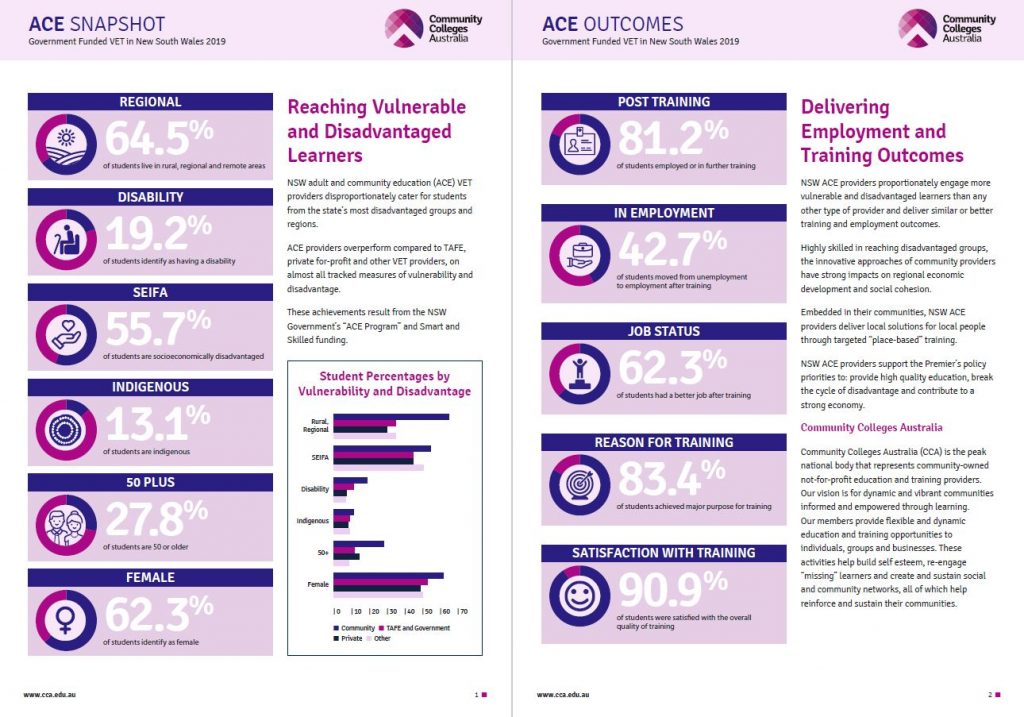Adult and community education – known as ACE – organisations shine in the NSW Upper Hunter Valley, providing great training services to many of the region’s vulnerable and disadvantaged communities and groups.
In preparation for the upcoming Upper Hunter by-election on 22 May, Community Colleges Australia (CCA) has analysed the impact of the not-for-profit community training sector in the area: three ACE providers enrolled almost 1,000 students in the electorate in 2019: Tamworth Community College, Atwea College (formerly WEA Hunter) and Central Coast Community College, which incorporates Hunter-V-Tec.
CCA has reached out to each of the candidates of major parties running in the by-election, to ensure that each one knows the background and strengths of our sector, and how we can assist the electorate to achieve its employment, training, education and community development goals,” said Dr Don Perlgut, CEO of Community Colleges Australia. (Read the summary sent to candidates here.)
About New South Wales Adult and Community Education
Not-for-profit ACE providers represent an important force in the NSW training landscape. Almost 40 community education providers provide post-secondary education and training to New South Wales residents, workers, students and communities. In 2019, NSW community providers delivered accredited vocational education and training (VET) to almost 15% (204,965 learners) of the state’s total of 1,387,750 students (including fee-for-service and government-funded students). This represented just over two thirds the number delivered by TAFE (21.8%, with 302,900 students). NSW community providers also delivered government-funded VET to 32,160 students in 2019, almost 8% of the state’s total.
ACE Providers Reach Vulnerable and Disadvantaged Learners
NSW community providers specialise in delivering education and training to many of the state’s most vulnerable and disadvantaged learners.
“On almost all tracked measures of vulnerability and disadvantage, NSW ACE providers significantly over-perform compared to TAFE, private for-profit and other providers, disproportionately catering for VET students from the state’s most disadvantaged groups and regions,” said Dr Don Perlgut.
“This achievement results from the funding provided by the NSW Government combined with the ability of NSW ACE providers to use the funds effectively and successfully to meet the needs of vulnerable learners of the state,” Dr Perlgut said.
In 2019, NSW ACE providers – well-represented in the Upper Hunter – achieved the following percentage proportions of their government-funded VET students:
- 19.2% students with a disability, compared to 11.7% of TAFE and government providers, 6.4.% of private for-profit providers and 5% of other VET providers;
- 64.5% regional and rural students, compared to 35.1% of TAFE and government providers, 30.1% of private for-profit providers and 35.5% of other providers;
- 55.7% most disadvantaged students in the bottom two SEIFA quintiles, compared to 45.5% of TAFE and government providers, 45.7% of private for-profit providers and 51.7% of other providers.
- 13.2% non-English speaking background students, compared to 21.1% of TAFE and government providers, 17.2% of private for-profit providers and 6.7% of other providers – this is the only student population that NSW ACE providers do not top the state, in large part because there are so many providers and students in regional areas, where there are fewer migrants.
- 27.8% older (age 50+) students, compared to 12.2% of TAFE and government providers, 14.4% of private for-profit providers and 7.9% of other providers.
- 13.1% Indigenous students, compared to 9.7% of TAFE and government providers, 7.6% of private for-profit providers and 8.4% of other providers. (Indigenous Australians constitute 2.9% of the state’s population.)
- 62.3% female students, compared to 53.3% of TAFE, 47.9% of private for-profit providers, and 50.2% of other providers – ACE providers engage in fewer traditional male-dominated programs, including trade apprenticeships, and deliver proportionately more female-dominated certificates such as Individual Care, Child Care and Hospitality.
Read the full CCA Upper Hunter By-Election Briefing here (PDF).






